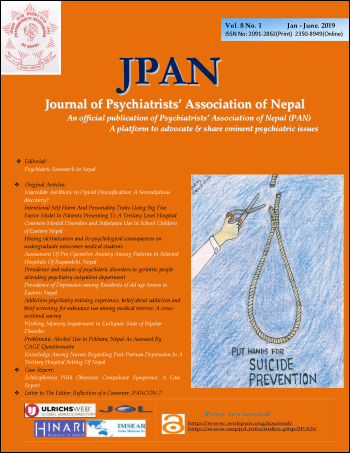Knowledge among Nurses Regarding Post-Partum Depression in a Tertiary Hospital Setting of Nepal
DOI:
https://doi.org/10.3126/jpan.v8i1.26339Keywords:
Nurses, Knowledge, Postpartum DepressionAbstract
Introduction: Postpartum depression is an important health problem which influences well-being, quality and security of life and may cause more serious problems than major depression occurring in normal life periods. It has an adverse influence on self-esteem, skills, child care, familial responsibility and roles of the mother. The aim of the study was to find out nurses’ knowledge regarding postpartum depression.
Material And Method: Descriptive study design was used to find out the knowledge regarding postpartum depression among nurses. Seventy-four nurses were selected from general and critical care units of a hospital by non probability enumerative sampling technique for the study. Data was collected by pre tested self-administered semi-structured questionnaire and collected data was analyzed by descriptive statistics (frequency, percentage, mean and standard deviation) with SPSS version 20.
Results: Fifty percent of respondents knew postpartum depression (PPD) is a type of mood disorder associated with childbirth. Majority of respondents knew poor marital relationship (85%), unwanted and unplanned pregnancy (83.88%), previous mental illness (78.40%) and lack of family support (66.20%) are risk factors of PPD. Regarding symptoms of PPD respondents knew low energy (78.37%), extreme sadness (68.91%), changes in sleeping and eating pattern (67.56%) and crying (66.21%). Eighty percentages of the respondents knew PPD can be identified by observation and antidepressant drug (88%) and psychotherapy (83.78%) are medical management of PPD. Majority of respondents knew nursing management of PPD are maintaining close observation of mother (93.24%), maintaining safe environment (86.48%) and family counseling (83.78%). Eighty one percentage respondents knew poor mother infant attachment is main consequence of PPD in child and poor relationship (54.05%), suicide (33.79%) and harm to baby (12%) in mother. Fifty four percentages had low knowledge regarding PPD.
Conclusion: It is concluded that knowledge regarding PPD is inadequate among nurses. It is recommended that hospital management should provide in-service education to nurses to uplift their professional knowledge regarding PPD and encourage applying knowledge in practice during care of women with PPD.
Downloads
Downloads
Published
How to Cite
Issue
Section
License
This license enables reusers to distribute, remix, adapt, and build upon the material in any medium or format, so long as attribution is given to the creator. The license allows for commercial use.




